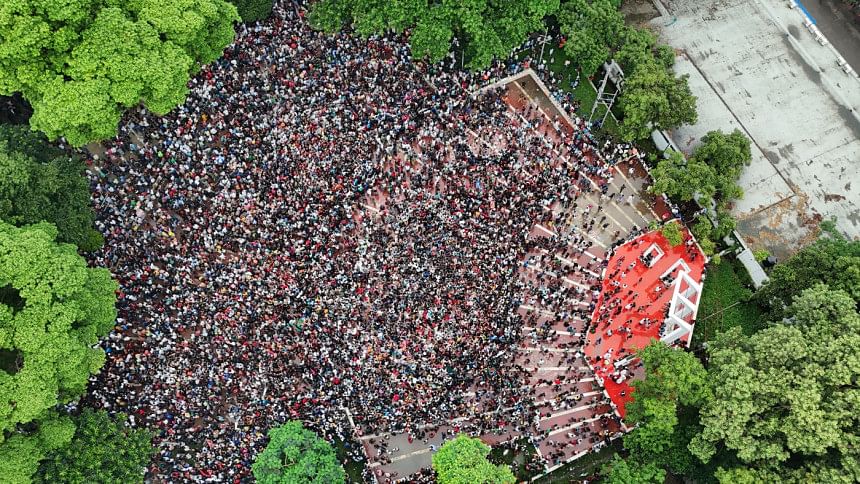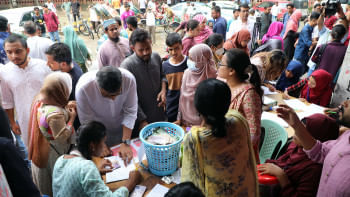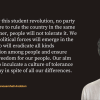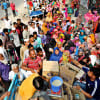July 2024 uprising: The lions need their own historians

"Until the lions have their own historians, the history of the hunt will always glorify the hunter." — Chinua Achebe
July 2024 will go down in the history of Bangladesh as the beginning of the end of the most ruthless regime ever, marking the "cruellest month(s)" in a political "Wasteland," the country had already morphed into. While the body politic was far from moribund, it was finally "mixing" the people's short- and long-term "memory" of woefully bad governance gone awry—no longer able or willing to choose its enemies wisely (the name of the game in politicking, or the art of priming the politics of crime)—with a resurgence of a collective "desire" to break free from a Gargantuan impasse thrust upon them.
To university and college students across the country, who had been relentlessly sidelined, silenced, and subalternised year after year, "something [was always already] rotten" "in the state of" Dhaka (to alliterate with "Denmark"). Consequently, there was a tipping point, where "To be, or not to be, that was [no longer] the question." In their perception and interpretation, "'twas [no more] nobler in the mind to suffer/the slings and arrows of outrageous fortune" than "to take arms against a sea of troubles/And by opposing end them," without worrying about "for whom the bell tolls" next. As if in a "tryst with destiny" (Nehru), they responded to their calling by taking to the public streets en masse.
Unlike Tiananmen Square in China or Tahrir Square in Egypt, this newfound popular uprising in Bangladesh, led by a student collective unaffiliated with corrupt and/or corruptible partisan, vicious, or vindictive politics, turned public streets into battlegrounds, tentacling across urban, peri-urban, and suburban areas nationwide. This was notably achieved by suburbanising the metropolis and metropolitanising the suburban—marginalising the centre and centring the margin—an epiphany held in abeyance for too long.
The student collective radically reimagined how inclusive and participatory governance and leadership could be orchestrated on the march, inspiring a "rhizomatic"—decentralised, dynamic, fluid, interconnected, multiplicitous, and open-ended—cognitive schema, rather than an "arborescent" or hierarchical, rigid, and linear one, to borrow from Deleuze and Guattari. They deserve kudos for reclaiming the historic role of student movements in pre- and post-liberation Bangladesh from the stranglehold of successive military and political governments, which imposed old, weary policies impervious to change. As Tagore's poem "Ore shabuj ore amar kancha, adhmorader gha mere tui bancha" exhorts, they resuscitated and rejuvenated the half-dead by jolting them out of their doldrums.

Succinctly put, the students not only thought outside the box but also took a quantum leap of imagination. Benedetto Croce's deceptively anti-historical dictum that "all history is contemporary history" played out in the open. The disenfranchised people, driven by the power of resilience and righteousness of cause, and galvanised by the discourse of equity and inclusivity, orchestrated by Gen Z (with even Gen Alpha joining forces), melted into one unstoppable force of fortitude and steadfastness. They took live bullets and endured merciless beatings from law enforcement carrying out orders from a rogue chain of command—not with disdain, but in stride. When the military eventually backed out of the regime's coercive span of control, it turned into a perfect storm, tipping the balance in favour of the people.
The tinderbox had been building up for at least a decade. The state apparatus was defined by "necropolitics" (Achille Mbembe), where draconian power was deployed to violate civic space and human rights, beefing up surveillance and exclusionary practices, underpinned by "biopolitics" (Foucault) to suppress opposition and decide who deserved to live and who needed to die. Violations by the repressive regime included a crackdown on freedom of the press and expression (Digital Security Act, 2018 and Cyber Security Act, 2023), regulatory overreach on the right to hold public meetings by opposition parties, rampant election rigging, extrajudicial killings by crossfire, and enforced disappearances. The regime secretly bought the Pegasus spyware and the SpearHead surveillance system from Israel in 2018, using a Bangkok-based middleman, while Bangladeshi intelligence officers were trained in Hungary by Israeli experts to eavesdrop on ordinary citizens, opposition officials, and protesters. Its preferred exclusionary practice of "biopolitics" was instantiated by the infamous torture chamber Aynaghar (House of Mirrors), which mirrored its song/lyric namesake by the Swedish death metal band Arch Enemy—a haunting labyrinthine house with endless corridors and deceptive mirrors. The notorious Guantanamo Bay and Abu Ghraib prison paled in comparison. The country became a massive "Panopticon," where all dissenting Homo sapiens were reduced to Homo sacer (Giorgio Agamben), or accursed men reduced to bare life, who could be killed with impunity without the right to embrace martyrdom.
The repressive government, led by arguably the country's most primed prime minister, was blinded by delusions of grandeur to be trigger-happy. Systematically dismantling all democratic institutions by pivoting on crony capitalism, demonocracy, disinformation, and kleptocracy, the regime mindlessly masked mounting misappropriations, embezzlements, capital flights, and depleted national exchequer bringing the country to the brink of bankruptcy with the belaboured narratives of mega-development. It widened the gap between the super-rich, who colluded with the corrupt government to accumulate enormous wealth at the expense of the dispossessed majority, with total impunity. The regime's intent to hold on to power indefinitely ignored or underestimated that it was always already embattled, if not beleaguered and besieged beyond belief and presupposition. As Foucault astutely observed, "Where there is power, there is resistance."
As competing narratives vied for control in the run-up to July 2024, the hunters—representing the regime—kept winning the controlling narrative to write the history of the hunt for decades until they could not. The tipping point came out of nowhere, like an iceberg in the ocean before the Titanic, reducing the regime to Neurath's boat, adrift and irrecoverable at sea. In other words, the experience of successfully hunting down all forms of opposition by crafting, manipulating, and weaponising a dualistic Manichean narrative of good (us) versus evil (them) to glorify its history was upended when it picked the wrong enemy: Gen Z, the new breed of lions in the body politic—able, agile, foresightful, and unencumbered, ready to take control of their destiny and history by speaking truth to power (revealing that the empress had no clothes). They learned fast from this Goliath in the road safety movement of 2018. As the deposed ex-prime minister, presided over hundreds of deaths of her own people with appalling abandon, she ran out of strategy unawares. Her abrupt and unforeseen loss of power and consequent exile came as a stark reminder of our inescapable brush with mortality when we least expect it, as captured by Emily Dickinson, "Because I could not stop for death/He kindly stopped for me."
Now that people's power has tipped the balance against the reign of terror, the journey to earn the much-coveted "holy grail" of democracy has transformed into a threshold marking the end of a new beginning. This "window of opportunity" rarely available to most nations must not be tinkered with or squandered. The roads taken by the unbroken stream of people on the long march from every nook and cranny of the periphery to the centre are now going to get longer and more arduous to return from. The watchword for this historic moment may be extracted from Chinua Achebe, "Until the lions have their own historians, the history of the hunt will always glorify the hunter." The hunting ground remains open and largely unguarded even as the new interim government takes over to embark on the daunting task ahead. The guarded optimism at this transition is that we are off to a good start, and, hopefully again, it is far from an open season for the hunters. However, this well-earned window of opportunity, calling for bold, new, and paradigmatic changes and initiatives, may be ephemeral.

What still haunts us most includes the arson of public and private properties, vandalism, revenge killings, and attempts to destabilise community harmony (the term "minority" needs to be retired as the nation regroups under the rubric of equity and equality). The absence of law enforcement, vilified by the past regime, exemplifies how institution after institution has been systematically rendered extractive and dysfunctional to serve the regime's vested interests, blurring the boundaries between the state and the ruling political party. It is heartening that students nationwide continue to lead by example, pioneering in volunteerism and vanguardism, with full community support, illustrating how to rebuild the dilapidated institutions by the bootstraps. This includes keeping tabs on marketplaces to lower the prices of goods and services, protecting the houses and places of worship of minority communities, preventing break-ins, plundering, pillaging, and vandalism with success (even with the use of drones), and taking on the roles of traffic wardens and street-cleaning crews. These activities are poised to bring the fragmented and fractured community back together.
History is aptly compared to a palimpsest, where layers of the past are rewritten, often at the expense of erasing what came before. This practice, particularly when driven by self-serving motives, can carry a heavy price. The downfall of Sheikh Hasina's repressive regime, culminating in her ignoble ouster from the country, is a stark testament to this disingenuous approach. By attempting to glorify her father through the manipulation of national history and the monopolisation of its nuanced narratives, Hasina overplayed her hand. Surrounded by sycophants who created an echo chamber, she became blind to her moral decline, a descent that ultimately led to her downfall—one she can no longer disown. August 15, the day when Bangladesh's founding father was tragically gunned down along with almost all members of his family, now stands in ironic contrast to the narrative of his once-illustrious daughter. Her transformation into a nemesis of her father's legacy, through crimes against humanity, will be indelibly inscribed in the history of Bangladesh.
Benedetto Croce's remarkable parable, where history is likened to "a silkworm that continues to spin its cocoon patiently by itself," even "when people stop wearing silk," illustrates how history assiduously connects our future with our past, even as we remain fixated on the present. The treacherous roads ahead will require more than mere maintenance, as we must remain committed to the promises we've made, understanding that there are still "miles to go before we sleep." The new lions in the body politic have taken the first steps, but the road to democracy remains long and treacherous, fraught with dangers and snares, requiring the hard work of our united will. The heavy lifting has just begun.
Currently, in the face of a colossal climatic nightmare caused by an unforeseen cloudburst resulting in torrential rainfall, millions of mostly marginalised people in eastern Bangladesh find themselves stranded, marooned, and caught between life and death, submerged under water. In response, the nation has once again united, finding a silver lining in the worst imaginable adversity. With one voice, the rallying cry resounds, "Help is on the way." In this dire situation, it is inspiring to see Gen Z carving out its own pathway by taking concrete actions rather than resorting to empty rhetoric—a habit typical of the previous government's functionaries. Kudos to the members of the armed forces who are leading by example. Even as the beginning of the end and the end of the beginning come to fruition, the beginning never ends, as it remains an endless journey toward new beginnings. The sunrise will keep the lions going, sundown after sundown.
Dr Faridul Alam teaches at the City University of New York.
Views expressed in this article are the author's own.
Follow The Daily Star Opinion on Facebook for the latest opinions, commentaries and analyses by experts and professionals. To contribute your article or letter to The Daily Star Opinion, see our guidelines for submission.

 For all latest news, follow The Daily Star's Google News channel.
For all latest news, follow The Daily Star's Google News channel. 










Comments